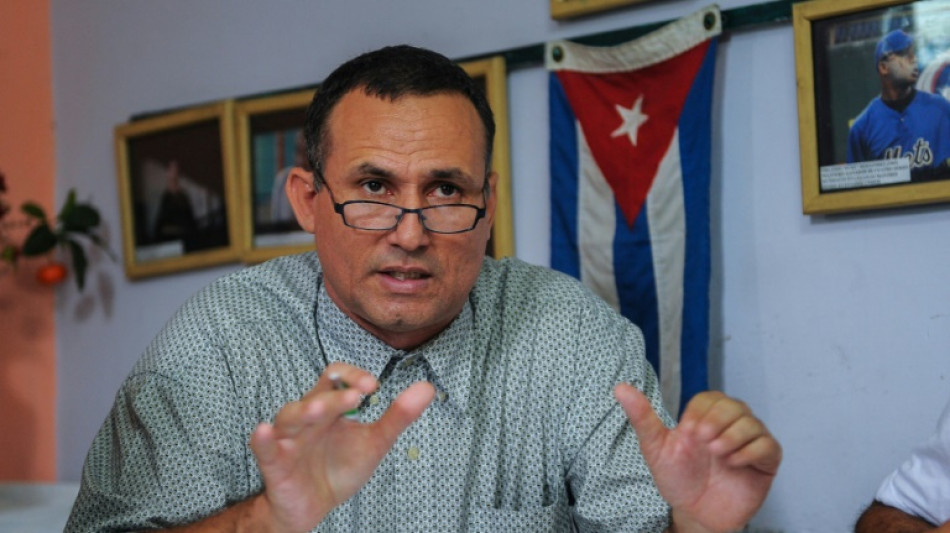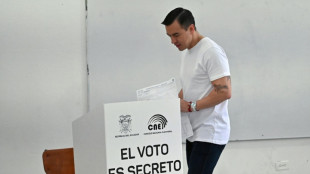
Top Cuban dissidents detained after court revokes parole

Cuban opposition leader Jose Daniel Ferrer and another dissident were detained Tuesday after a court revoked the parole they were granted under a landmark deal Havana had struck with former US President Joe Biden.
Ferrer and Felix Navarro, who were both released from prison in January, were among 553 inmates Cuba said it would free after Biden agreed to remove the country from a US list of terrorism sponsors.
Biden's successor Donald Trump has since reinstated Cuba on the list.
On Tuesday, Cuba's Supreme Court said Ferrer, 54, and Navarro, 72, had "failed to comply with the provisions of the law during the probation period to which they were subjected."
Family members and the opposition reported both had been arrested, though their whereabouts were unknown.
Trump's State Department condemned what it called "the brutal treatment and unjust detention" of the men, as well as family members and other activists who were also rounded up.
Ferrer, who has been in and out of prison on the communist-run island for years, was granted parole in January after his latest stint of more than three years behind bars.
He was the highest profile prisoner that Cuba released after the Vatican-mediated deal with Biden.
Ferrer's sister Ana Belkis Ferrer Garcia, based in the United States, wrote on X Tuesday that security forces had stormed the headquarters of the UNPACU opposition organization her brother had founded in 2011 and ran from his home.
They took her brother, his wife Nelva, their son "little Daniel Jose" and other activists "to an unknown location," she added.
Ferrer's wife and son were released after several hours, the sister said later.
Navarro, for his part, was detained early Tuesday at his house, according to Manuel Cuesta Morua of the Council for Democratic Transition in Cuba (CTDC), an opposition group.
"We do not know his exact whereabouts," Morua wrote on X.
Ferrer and Navarro have both previously been declared prisoners of conscience by Amnesty International.
Havana denies it holds political prisoners and says its opponents are "mercenaries" being paid by the United States.
- 'Blatant' violation -
Cuba claimed it had released all 553 people it agreed to free under the deal with the Biden administration, including 231 considered political prisoners by rights groups.
Most of the 231, including Ferrer and Navarro, were rounded up in a crackdown on mass protests against the Cuban government in July 2021.
Both men have been repeatedly jailed over the years and were sent back to prison following the protests of July 2021.
Since his release in January, Ferrer has continued to criticize the government on social networks, and ran a canteen at his home for people in need, funded by Cubans abroad.
He claims the authorities despise his social activism for highlighting the poverty in which many live.
The CTDC in a statement denounced what it called a "coordinated operation by state security aimed at neutralizing two of the most important leaders of the Cuban dissident movement."
Opposition political parties are not allowed in the one-party state.
The Supreme Court said Tuesday Ferrer had ignored two summons to appear in court while out on parole.
As for Navarro, the court said he had left his municipality seven times without seeking a judge's permission "in blatant violation of the law."
It also claimed the men "maintain public ties" with the US chief of mission in Cuba, Mike Hammer, who took up his post in November.
Over the past months, Hammer has visited several dissidents in several parts of Cuba.
On Monday, he met Guillermo "Coco" Farinas, a dissident journalist who has repeatedly gone on hunger strike to protest what he calls the Cuban "dictatorship."
Writing on X about the meetings with Hammer and subsequent re-arrests of Ferrer and Navarro, Cuba's deputy foreign minister Carlos Fernandez de Cossio said Cuba had "the right to protect itself from US aggression."
S.Yang--SG

 London
London

 Manchester
Manchester
 Glasgow
Glasgow
 Dublin
Dublin
 Belfast
Belfast
 Washington
Washington
 Denver
Denver
 Atlanta
Atlanta
 Dallas
Dallas
 Houston Texas
Houston Texas
 New Orleans
New Orleans
 El Paso
El Paso
 Phoenix
Phoenix
 Los Angeles
Los Angeles


